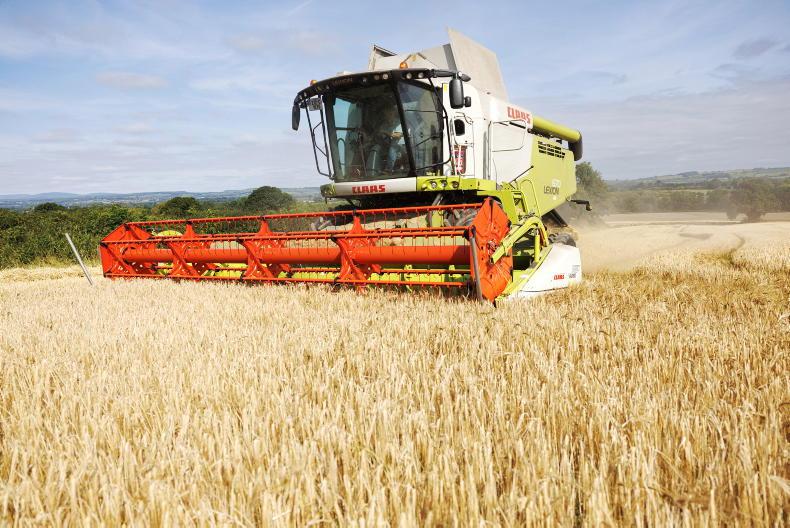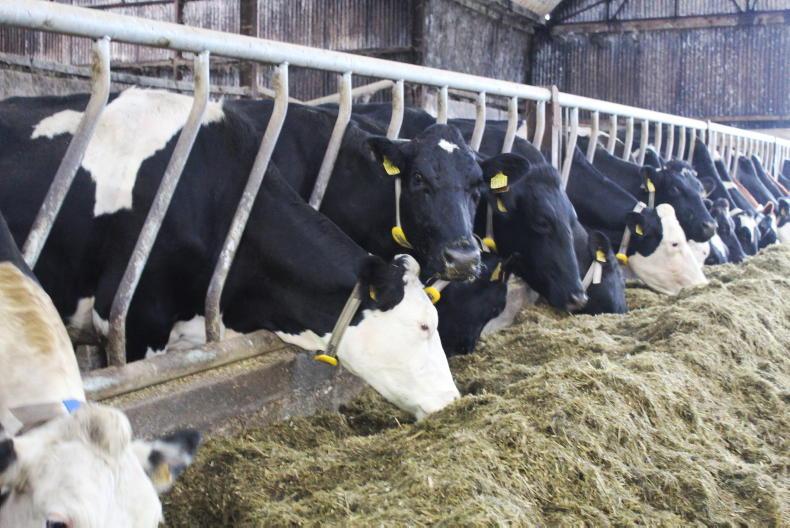The leadership of the Ulster Farmers’ Union (UFU) has maintained a firm position on the UK’s withdrawal from the EU despite criticism coming from some members and local politicians.
At a roadshow event in Coleraine on Monday, UFU president Ivor Ferguson continued to defend the union’s support of the draft Brexit withdrawal agreement, including the backstop.
“Some members of different political parties weren’t happy with our decision, but at the end of the day we as farmers made the decision and we have to stand on our two feet. We don’t want to be bullied or talked over by politicians,” he said.
The backstop element of the withdrawal agreement is the insurance policy which aims to prevent a hard border in Ireland, and was the key factor which led the DUP and 118 Conservative MPs to vote against the deal in the House of Commons last week.
Transition
Ferguson pointed out that it would only be considered for use if the UK and EU did not reach a free trade agreement within the transition period after Brexit, which is currently set to be 21 months, but could be extended further.
He maintained that EU member states would not want NI having access to the European market without paying into the EU budget, so it would be unlikely that the backstop would be used.
“I don’t think the backstop is such a big fear or scare,” Ferguson said.
Also speaking on the topic, UFU deputy president Victor Chestnutt highlighted that the backstop would allow unfettered access for NI food into Britain, with product still labelled as UK origin and Red Tractor standard.
He said that the backstop would require checks around seven containers coming from Britain to NI each day, and likened these checks to inspections which are currently required on livestock crossing the Irish Sea.
Checks
“Those checks have had to be done for years and I don’t think it has ever made anybody feel constitutionally less important,” Chestnutt said.
Ivor Ferguson reiterated that the UFU supports the draft withdrawal agreement because it is the only option at present other than a no-deal Brexit.
But he added that the union would back a better deal if it came on the table.
One option he suggested was the whole of the UK remaining in the EU customs union which would mean the UK having the same trade policy and tariff schedule as the EU.
“I would be quite happy in the customs union because it would stop [UK International Trade Secretary] Liam Fox bringing in food that is below our standards. It would get rid of the border issue so we wouldn’t need a backstop,” Ferguson said.
Membership
During the question session, UFU leaders were asked if many farmers had cancelled their membership over the union’s support of the draft withdrawal agreement.
In response, UFU membership director Derek Lough explained that the union routinely loses around 500 members every year, with the challenge for the team being to sign up new members.
“Overall, we were up last year. Exact figures are to be confirmed but its somewhere between 30 and 50 members. Retention rate was more than 96%,” he said.
According to Ivor Ferguson, around 10 farmers contacted him to complain about the UFU’s Brexit stance.
“But I had five times more who said: ‘well done for standing up and making a decision’,” he added.
UFU wants new schemes piloted in NI after 2019
The UFU will be pressing for new schemes to be piloted in NI after 2019 as part of post-Brexit agricultural policy, farmers were told in Coleraine on Monday.
UFU chief executive Wesley Aston said that there would be flexibility to change the current system of area-based payments from 2020 onwards, provided there is a minister at DAERA.
He suggested schemes such as a soil-sampling initiative, the land mobility service, tax incentives for longer-term land leasing and a coupled payment on suckler cows or sheep, could be piloted as part of domestic agricultural policy.
“Other devolved regions are talking about not doing anything new until 2022. We would like to move in advance of that if we can,” Aston maintained.
However, he acknowledged that new schemes would only take up some of the budget, meaning area-based payments would remain part of agricultural policy for some time.
Aston also said that a DAERA consultation is expected later this year on whether to freeze Basic Payment entitlements in NI at their 2019 level, or continue the final two steps towards the regional flat rate in 2020 and 2021.
“The UFU is yet to take a position on that, but we will consider it when the consultation comes out,” he added.
Read more
Hard Brexit would impose 'embargo' on NI livestock farmers – UFU
DAERA increasing preparations for Brexit
The leadership of the Ulster Farmers’ Union (UFU) has maintained a firm position on the UK’s withdrawal from the EU despite criticism coming from some members and local politicians.
At a roadshow event in Coleraine on Monday, UFU president Ivor Ferguson continued to defend the union’s support of the draft Brexit withdrawal agreement, including the backstop.
“Some members of different political parties weren’t happy with our decision, but at the end of the day we as farmers made the decision and we have to stand on our two feet. We don’t want to be bullied or talked over by politicians,” he said.
The backstop element of the withdrawal agreement is the insurance policy which aims to prevent a hard border in Ireland, and was the key factor which led the DUP and 118 Conservative MPs to vote against the deal in the House of Commons last week.
Transition
Ferguson pointed out that it would only be considered for use if the UK and EU did not reach a free trade agreement within the transition period after Brexit, which is currently set to be 21 months, but could be extended further.
He maintained that EU member states would not want NI having access to the European market without paying into the EU budget, so it would be unlikely that the backstop would be used.
“I don’t think the backstop is such a big fear or scare,” Ferguson said.
Also speaking on the topic, UFU deputy president Victor Chestnutt highlighted that the backstop would allow unfettered access for NI food into Britain, with product still labelled as UK origin and Red Tractor standard.
He said that the backstop would require checks around seven containers coming from Britain to NI each day, and likened these checks to inspections which are currently required on livestock crossing the Irish Sea.
Checks
“Those checks have had to be done for years and I don’t think it has ever made anybody feel constitutionally less important,” Chestnutt said.
Ivor Ferguson reiterated that the UFU supports the draft withdrawal agreement because it is the only option at present other than a no-deal Brexit.
But he added that the union would back a better deal if it came on the table.
One option he suggested was the whole of the UK remaining in the EU customs union which would mean the UK having the same trade policy and tariff schedule as the EU.
“I would be quite happy in the customs union because it would stop [UK International Trade Secretary] Liam Fox bringing in food that is below our standards. It would get rid of the border issue so we wouldn’t need a backstop,” Ferguson said.
Membership
During the question session, UFU leaders were asked if many farmers had cancelled their membership over the union’s support of the draft withdrawal agreement.
In response, UFU membership director Derek Lough explained that the union routinely loses around 500 members every year, with the challenge for the team being to sign up new members.
“Overall, we were up last year. Exact figures are to be confirmed but its somewhere between 30 and 50 members. Retention rate was more than 96%,” he said.
According to Ivor Ferguson, around 10 farmers contacted him to complain about the UFU’s Brexit stance.
“But I had five times more who said: ‘well done for standing up and making a decision’,” he added.
UFU wants new schemes piloted in NI after 2019
The UFU will be pressing for new schemes to be piloted in NI after 2019 as part of post-Brexit agricultural policy, farmers were told in Coleraine on Monday.
UFU chief executive Wesley Aston said that there would be flexibility to change the current system of area-based payments from 2020 onwards, provided there is a minister at DAERA.
He suggested schemes such as a soil-sampling initiative, the land mobility service, tax incentives for longer-term land leasing and a coupled payment on suckler cows or sheep, could be piloted as part of domestic agricultural policy.
“Other devolved regions are talking about not doing anything new until 2022. We would like to move in advance of that if we can,” Aston maintained.
However, he acknowledged that new schemes would only take up some of the budget, meaning area-based payments would remain part of agricultural policy for some time.
Aston also said that a DAERA consultation is expected later this year on whether to freeze Basic Payment entitlements in NI at their 2019 level, or continue the final two steps towards the regional flat rate in 2020 and 2021.
“The UFU is yet to take a position on that, but we will consider it when the consultation comes out,” he added.
Read more
Hard Brexit would impose 'embargo' on NI livestock farmers – UFU
DAERA increasing preparations for Brexit








SHARING OPTIONS